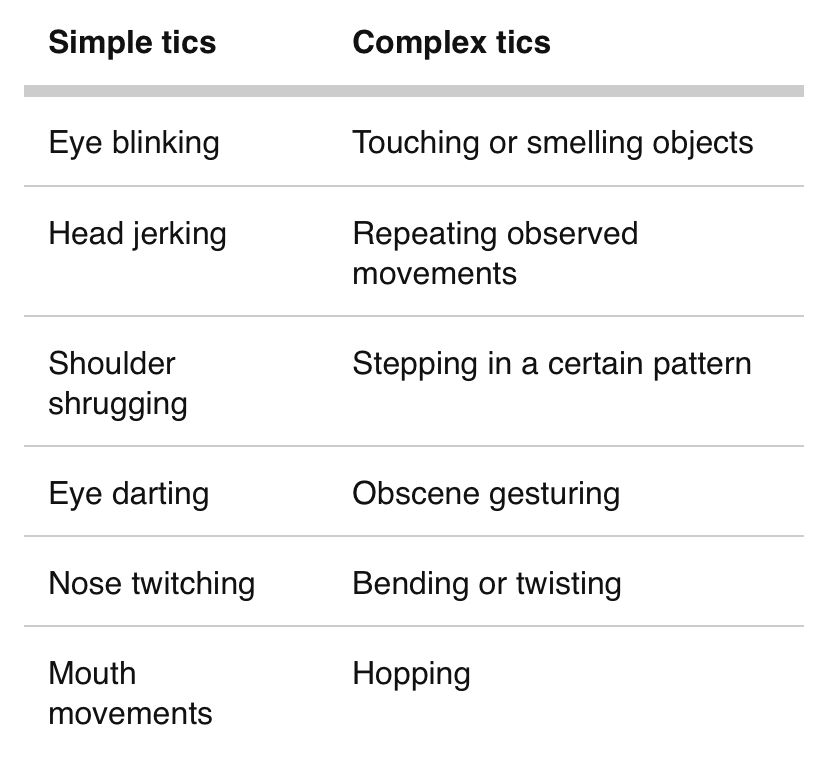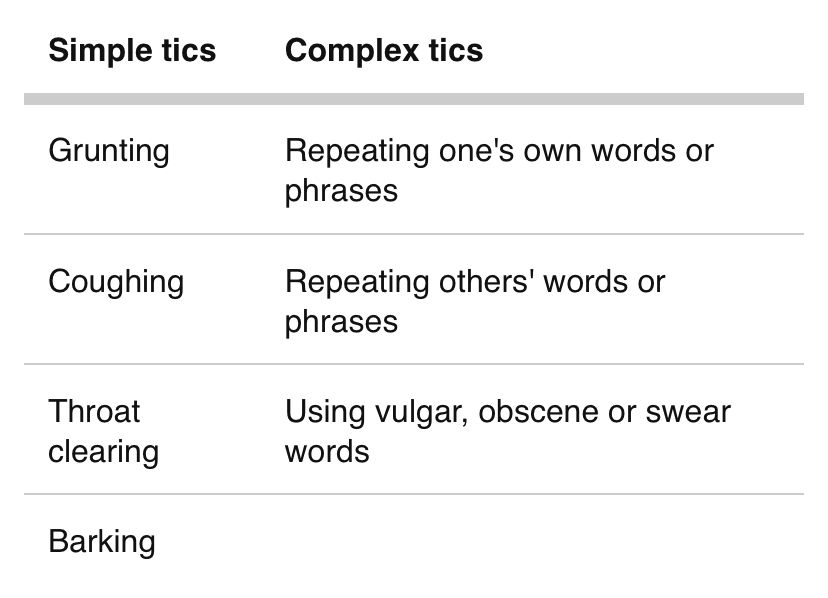𝑡𝑜𝑢𝑟𝑒𝑡𝑡𝑒 𝑠𝑦𝑛𝑑𝑟𝑜𝑚𝑒

𝑇𝑂𝑈𝑅𝐸𝑇𝑇𝐸 𝑆𝑌𝑁𝐷𝑅𝑂𝑀𝐸, often referred to as tourette's, is a disorder that involves "repetitive movements or unwanted sounds (tics) that can't be easily controlled". it is only one type of Tic Disorder, the others being Persistent (Chronic) Motor or Vocal Tic Disorder, and Provisional Tic Disorder.
in the United States, there are more than 200,000 cases of tourette syndrome per year. males are 3 times more likely to develop tourette's than females. the is no cure for tourette's, only treatment through medication, self-care, and therapy.
tics usually appear between the ages of 2 and 15, the average age being about 6 years old.

𝑆𝑌𝑀𝑃𝑇𝑂𝑀𝑆
𝑤ℎ𝑎𝑡 𝑖𝑠 𝑎 𝑡𝑖𝑐?
a tic is a "sudden, brief, intermittent movement or sound". they can range from mild to severe, and can interfere with communication and certain activities during the day.
simple tics; sudden, brief, repetitive tics that involve a small number of muscle groups
complex tics; distinct, coordinated patterns that involve multiple muscular groups
motor tics; movement
some common motor tics (this is not all, just a small group that are most common)

vocal tics; sounds
some common vocal tics (this is not all, just a small group that are most common)

In 10-15% of cases, the words may be inappropriate (i.e., swear words, ethnic slurs, or other socially unacceptable words or phrases). This type of vocal tic, called coprolalia, is often portrayed or mocked in the media as a common symptom of TS.
other information about tics
- can vary in type, frequency, and severity
- worsen when sick, stressed, tired, excited, or anxious
- they can change over time
- often worsen in early teenage years, and improve when going into adulthood
what does your character feel?
before a tic, there is an uncomfortable sensation in the body, such as an itch, tingle, or tension. expression of a tic brings relief. most tics do not hurt, other than self harm tics (punching or hitting yourself, etc).

𝐶𝐴𝑈𝑆𝐸𝑆
"The exact cause of Tourette syndrome isn't known. It's a complex disorder likely caused by a combination of inherited (genetic) and environmental factors. Chemicals in the brain that transmit nerve impulses (neurotransmitters), including dopamine and serotonin, might play a role."
Conditions often associated with Tourette syndrome include:
* Attention-deficit/hyperactivity disorder (ADHD)
* Obsessive-compulsive disorder (OCD)
* Autism spectrum disorder
* Learning disabilities
* Sleep disorders
* Depression
* Anxiety disorders
* Pain related to tics, especially headaches
* Anger-management problems
obviously this doesn't mean that every person with tourette's has all of these conditions as well. however, tourette's is accompanied by ADHD 50% of the time.

𝑆𝑂𝑈𝑅𝐶𝐸𝑆
https://www.mayoclinic.org/diseases-conditions/tourette-syndrome/symptoms-causes/syc-20350465
https://tourette.org/about-tourette/overview/what-is-tourette/#1461071628539-4f1f68e0-cd8d

Bạn đang đọc truyện trên: AzTruyen.Top